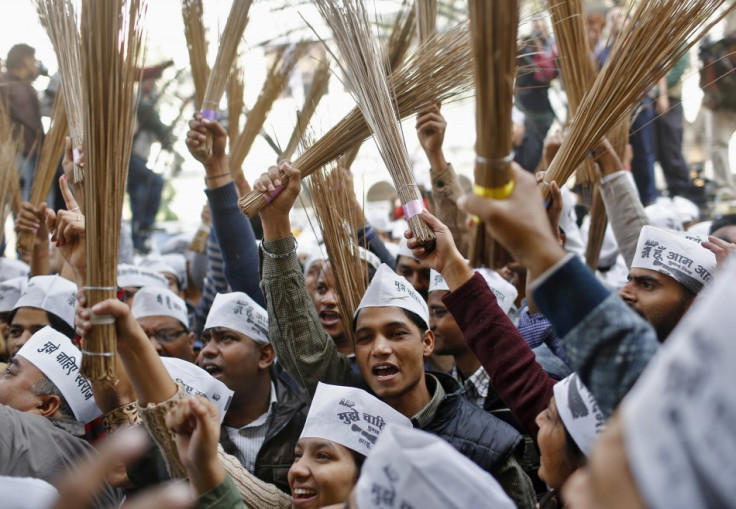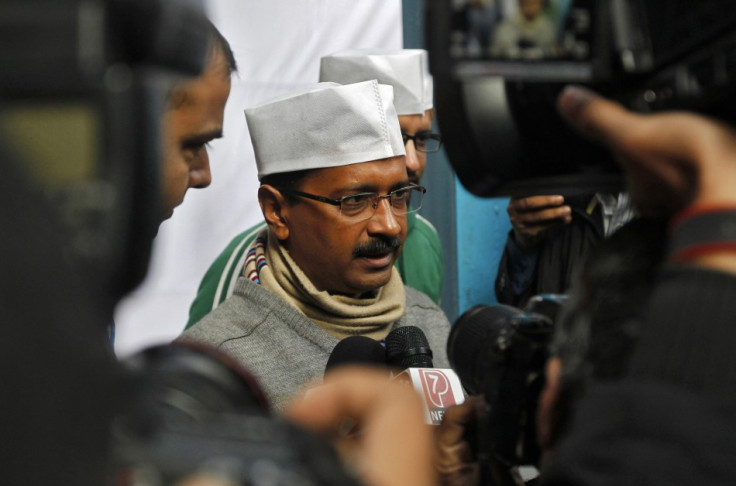India: Common Man's Party Ushers in Broomstick Revolution

India's youngest political party, founded by a reluctant politician, has staged perhaps one of the biggest electoral upsets in recent history, giving hopes to billions that there is a workable alternative to corrupt and inefficient governance.
In elections held this week to the assembly of the New Delhi state, which encompasses the national capital region, the Aam Aadmi Party (AAP) won 28 out of 70 seats and garnered more than 30% of total votes, decimating the ruling Congress party and denying the opposition Hindu nationalist Bharatiya Janata Party (BJP) a clear majority.
The AAP, which translates into the "common man's party", pulled off this electoral coup coming from nowhere and after being dismissed as a passing interlude in the great march of democracy by the mainstream parties.
By choosing the broom as its electoral symbol, the new party made it clear its mission was to sweep politics clean and remove corruption from governance. Such symbolism was ridiculed as the political parallel of romantic sentimentalism, but Arvind Kerjriwal and his spirited followers proved otherwise, with the clean-up act severely undercutting the fortunes of the two political parties that had traditionally shared the electoral sweepstakes in the state.
Kejriwal, an alumni of the ivy league Indian Institute of Technology (IIT), established the AAP in 2012 going against his avowed principle of staying away from electoral politics and trying to change the system from outside.
Kejriwal was one of the key followers of Anna Hazare, who in 2011 led a massive anti-corruption campaign, drawing thousands of ordinary people into the streets. "Team Anna" had whipped up the imagination of ordinary, middle-class Indians fed up with corruption, nepotism, vile bureaucracy and chronic inefficiency of governments.
Hazare, a civil rights leader and prominent Gandhian, demanded that the government replace a loophole-riddled piece of anti-corruption legislation with a stronger one. Kejriwal was an early supporter along with senior lawyers and right to information activists.
The movement quickly gained traction among the frustrated urban middle class and Hazare's hunger protests helped swell the ranks of supporters, forcing the government to talk to the protest leaders. However, the protracted agitation lost momentum gradually as it came under the crushing wheels of the government, while internal schism also aided the disintegration.
The government rejected the draft legislation proposed by the Team Anna and challenged Kejriwal and other leaders to participate in the political process if they wanted to change the system.

At this point Kejriwal, a former income tax official and winner of the Ramon Magsaysay Award for his contribution to the Right to Information Act, decided to part ways with Hazare and launch a political party, convinced that it was futile to try to change the system from outside.
Beacon of Hope
A year after, the AAP has clearly become a beacon of hope for people across the country. When Kejriwal took on three-term Chief Minister Sheila Dixit in a constituency she represented for 25 years, analysts termed it as a suicidal flash of hubris. But when the votes were counted, he had won by a margin of 25,000 votes. The 27 others of his party who made their way to the state legislature are not regular politicians; they range from soldiers to journalists and social workers to unemployed people and a vast majority of them are below 40 years.
When his party released its manifesto for the Delhi elections, anti-corruption push was the main plank. Kejriwal said if his party was elected to power he would bring in the "Jan Lokpal", or an anti-corruption ombudsman, within 15 days in the assembly.
"This Delhi Jan Lokpal Bill would cover all the officials and employees of Delhi Government, from the Chief Minister to MLAs. Under this law, it would be mandatory for everyone to declare their asset. The Lokpal would have full autonomy, administrative, financial and functional independence and powers to take action public servants," the head of the AAP's manifesto committee said.
He also promised to lower electricity tariffs, provide safe drinking water to every household and improve the standard of healthcare and education in the national capital.
In the event the AAP came within sniffing distance of power and shook up the establishment. The fledgling, party, which was "non-political" at its birth a year ago, was propelled by the anger of the educated urban masses against government nonchalance to matters affecting ordinary and the poor and the deep-rooted corruption.
With Kejriwal's party refusing to stitch together a coalition or give support to the BJP in forming the government, New Delhi is more likely headed for another election.
"We will play the role of a constructive opposition and will not seek or give support from any party to form the govt ... This is a historic election result in many respects. This is not a victory of the Aam Aadmi Party, but a victory of the people," Kejriwal said following his party's impressive win in 28 seats.
By ruling out alliance with parties that he opposed, Kejriwal certainly aims to hold his political stock high and look to deal a sucker punch at the hustings.
And he has made it clear that the AAP's aim is to spread its influence far outside Delhi and make an impact in the general election due next year. "We will not stop with Delhi. This fire will spread across the country. Our next mission would be to offer a genuine political alternative in the Lok Sabha elections 2014."
© Copyright IBTimes 2025. All rights reserved.






















